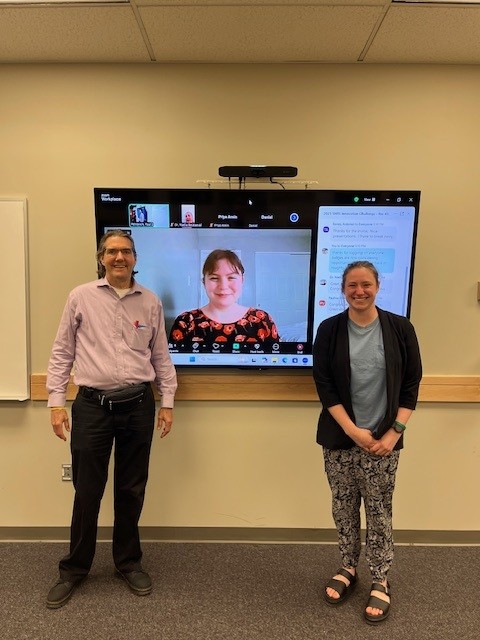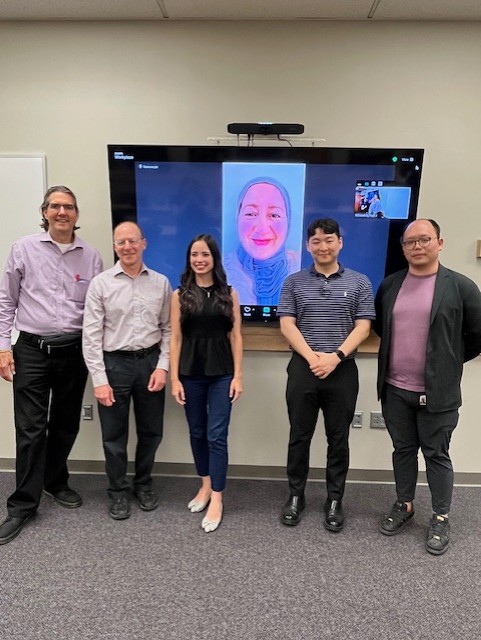OIE Mentor Supports Innovators’ Growth and Potential
Office of Innovation and Entrepreneurship 2025 James “Chip” Hanlon Volunteer Mentor of the Year:... Read more
Office of Innovation and Entrepreneurship 2025 James “Chip” Hanlon Volunteer Mentor of the Year:... Read more
Celebration of Innovation and Entrepreneurship 2025 Regional Business of the Year-- Sarris Candies Sarris Candies, a... Read more
Posted on by Mike Yeomans
With $40,000 of funding to advance their ideas toward commercial application on the line, the three finalists for the School of Rehabilitation Science’s (SHRS) Innovation Challenge pitched their solutions to problems experienced by people with attention deficit disorder, caregivers of individuals with dementia, and improving cognitive therapy for stroke patients.
The finalists each faced probing questions from a panel of judges including Peter Allen, executive director of inventor engagement & new ventures, and Alex Ducruet, executive director of innovation commercialization at the Innovation Institute, part of the Office of Innovation and Entrepreneurship, along with Jonathan Pearlman, associate dean for commercial translation at SHRS.
Questions included how they selected their target consumers, the differentiation of their innovations from potential competitors, and the feasibility of their go-to-market strategies. The finalist teams all participated in an NSF I-Corps short course as part of the competition, where they interviewed potential customers and users of their product to better understand their unmet needs and begin defining a value proposition for their products to solve them. This prepared them well to answer the judges’ questions with relative ease.



Receiving the top prize of $20,000 was team PopOff, led by Kiera Acitelli, a master’s student in the Department of Rehabilitation Technology. She and fellow student Sarah Bailey are developing a solution for adults struggling with Attention Deficit/Hyperactivity Disorder (ADHD) to assist them in motivating and tracking the completion of daily tasks.
“We’ve encountered a multitude of people in our interviews in similar situations, many of whom feel as if their struggles are often overlooked because they are adults,” Acietlli said.
“PopOff offers unique functionality that does not currently exist elsewhere in the market. It’s also important to me to share this technology with people who will benefit from it, as I have firsthand experience with how intensely frustrating it can be to struggle with seemingly mundane, everyday tasks and how beneficial a little support can be.”
They are creating a modular system of lighted reminder buttons at the point of performance that reset via a remote device. Acitelli said the award money will assist with the continued refinement of the product prototype and testing.
Receiving a $10,000 prize is Health App Review Tool (HART). The team, led by Julie Faieta, assistant professor in the Department of Rehabilitation Science and Technology, is developing an app to assist caregivers of people with dementia in curating the best apps of the dozens available that best meet their specific caregiving needs.
Faieta said dementia caregivers are under enormous strain, harming their own health and careers as they are required to dedicate more time to their caregiver role.
“For over a decade, I’ve watched my mother care for my grandmother with dementia, and I’ve seen firsthand how deeply the caregiver role can affect every aspect of a person’s life,” she said. “This experience drives our team’s commitment: we don’t just work for dementia caregivers—we are them. We know and love people in this role, and that personal connection fuels our determination.”
She said the SHRS Challenge award will help her team expand the library of apps that are screened, rated, and cataloged to more than 250 before identifying and engaging with early adopters identified through dementia advocacy organizations.
“Evaluating its effectiveness in real-world settings with a small group of users is a crucial step that will inform our final refinements and help prepare the tool for successful commercialization,” she said.
The second $10,000 winner was Alina Vielhaber, who is developing VRNeuroSyncEEG, a device to help occupational therapists detect when patients are experiencing cognitive fatigue.
The SHRS Challenge debuted five years ago after Dave Brienza, associate dean for technology and innovation at SHRS, reached out to the Innovation Institute to assist with creating an innovation competition that would spur SHRS faculty and students to pursue commercial translation of their innovations.
“The SHRS Challenge has been a great success, and we appreciate the partnership we have enjoyed with the school to provide an outlet for the amazing innovation happening there,” said Paul Petrovich, director of new ventures at the Innovation Institute, part of the Office of Innovation and Entrepreneurship.
Petrovich congratulated the competition participants for the work they have put into their innovations.
“You can see that it can be a lot harder than it sounds, but the insights you have gotten from working with mentors and talking with customers has gotten you off to a good start on your journeys,” Petrovich said. “You can count on our continued support at every step on your path to market.”
Another innovation competition is right around the corner. Applications are open for the 2025 Wells Student HealthTech Challenge. An information session will be on Tuesday, August 26, from 12-1 p.m.